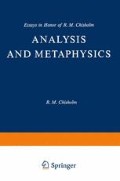Abstract
According to Hobbes, “a body is that, which having no dependence on our thought, is coincident or coextended with some part of space”.1 Bodies in Hobbes’ sense are material objects in ours; so at any rate I shall assume. And I shall assume also that his definition is correct at least in its implication that coincidence with some part of space is required of anything that is to count as a material object. But what is to count as a part of space?
Access this chapter
Tax calculation will be finalised at checkout
Purchases are for personal use only
Preview
Unable to display preview. Download preview PDF.
Notes
Cantor, ‘Ein Beitrag zur Mannigfaltigkeitslehre’, Journ. für die Reine and Angewandte Math. 84 (1878), 242–258.
The phrase, though not the view, is J. L. Austin’s. See Sense and Sensibilia, Oxford, 1962, p. 8.
Kuratowski, Topology,Volume I, New York and London, 1966, p.75. A common alternative is ‘regular open set’.
Compare Halmos, Lectures on Boolean Algebras, Princeton, N.J., 1963, p. 14.
The identification of receptacles with non-null open domains was suggested to me by remarks made by Tarski in ‘Foundations of the Geometry of Solids’, included in his Logic, Semantics, and Metamathematics,Oxford, 1956, pp. 24–29.
See, e.g., his Letter to Arnauld, April 30, 1687, in George R. Montgomery (trans.), Leibniz: Discourse on Metaphysics, Correspondence with Arnauld, and Monadology,LaSalle, Ill., 1945, esp. pp. 189–191.
Every extended mass may be considered as a composite of two or of a thousand others, and the only extension there is, is that by contact. Consequently, we shall never find a body of which we can say that it is really one substance; it will always be an aggregate of several.“ Leibniz, Draft of the letter of Nov. 28-Dec. 8, 1686 to Arnauld, in Montgomery (op. cit.),pp. 149–157. The quotation is from pp. 154–5.
The least corpuscle is actually subdivided in infinitum and contains a world of other creatures which would be wanting in the universe if that corpuscle was an atom, that is, a body of one entire piece without subdivision.“ Leibniz, Fourth Letter to Clarke, in Leroy E. Loemker (trans. and ed.), Leibniz: Philosophical Papers and Letters,Second Edition (1970), pp. 687–691. The quotation is from p. 691.
Henry S. Leonard and Nelson Goodman, ‘The Calculus of Individuals and its Uses’, Journal of Symbolic Logic 5 (1940), 45–55. I have not had access to the earlier expositions given by Lesniewski, for references to which see the bibliography in Eugene C. Luschei, The Logical Systems of Lesniewski, Amsterdam, 1962.
Compare David Wiggins, Identity and Spatio-Temporal Continuity,Oxford, 1967, p. 68.
See McTaggart, The Nature of Existence, Vol. I, Cambridge, 1921, p. 176; and Quine, From a Logical Point of View, Second Edition, revised, New York, 1963, pp. 65–79.
Thus C. D. Broad: “It is plainly contrary to common sense to say that the phases in the history of a thing are parts of the thing”. (Examination of McTaggart’s Philosophy,Vol. I, Cambridge, 1933, pp. 349–350.)
Author information
Authors and Affiliations
Editor information
Editors and Affiliations
Rights and permissions
Copyright information
© 1975 D. Reidel Publishing Company, Dordrecht-Holland
About this chapter
Cite this chapter
Cartwright, R. (1975). Scattered Objects. In: Lehrer, K. (eds) Analysis and Metaphysics. Philosophical Studies Series in Philosophy, vol 4. Springer, Dordrecht. https://doi.org/10.1007/978-94-010-9098-8_9
Download citation
DOI: https://doi.org/10.1007/978-94-010-9098-8_9
Publisher Name: Springer, Dordrecht
Print ISBN: 978-90-277-1193-9
Online ISBN: 978-94-010-9098-8
eBook Packages: Springer Book Archive

